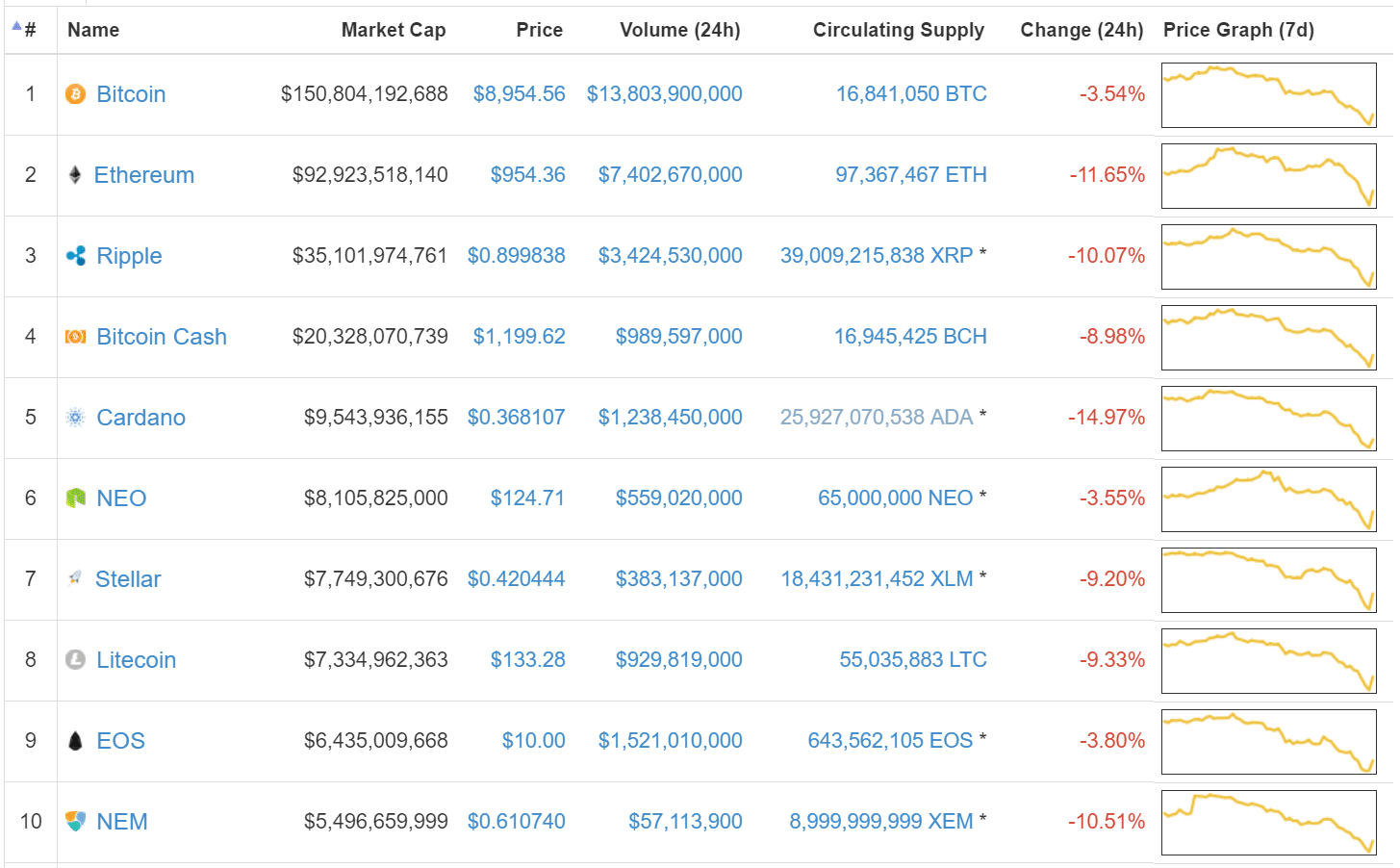This Week in Cryptocurrency – February 2nd, 2018
Is There a Doctor in the Room to Stop the Bleeding?
The archaic art of bloodletting was a common medical practice used by doctors from the Ancient Greeks up to European surgeons of the 19th century. It was assumed that the humours (blood and other bodily fluids) carried sickness and disease, so doctors would bleed their ill patients in the hopes of relieving their maladies.
Well, the cryptocurrency market is bleeding heavily right now, and much like the antiquated practice, it’s doing little to make things better–its also far from humorous.
Bitcoin: This big fella’ has seen better days. The bottom hasn’t dropped out, but we’re starting to wonder where the bottom is as Bitcoin keeps dropping to lower levels of support. Crypto’s heavy hitter is down 18% from his price point going into last Friday, sitting at roughly $9,000. As many of us were nestled in our beds last night, Bitcoin drooped to $7,800, lower than January’s mega-correction and its lowest since the second half of November.
Ethereum: Coin Market Cap’s silver medalist is actually outcompeting Bitcoin this week, even if its still in the red. Ethereum has lost about 8% of its value from last week, currently priced at $950. Like Bitcoin, it had a flash dip down to some extreme lows last night, touching down at $779 for the first time since the first day of the New Year.
Ripple: As with last week, Ripple’s been hit the worst out of our top three. It’s down 28% from its entry into last Friday with an asking price of $0.88, and it went to as low as $0.64 overnight.
Honorable Mentions: In spite of the general market bloodbath, DigixDAO ($319) is up 28% over the last 24 hours and 23% over the past week. Besides this, nothing else in the market is swimming well against the current of falling prices.
Over 1 Million People Join Robinhood for Free Crypto Trading: One of the biggest issues with trading cryptocurrencies are the heavy fees. Coinbase, for example, charges 1.49% on all buy/sell orders, an obscene amount when compared to Binance’s 0.1% trading fee. However, nothing beats free.
Major Exchange Huobi to Open Offices in USA: Chinese founded exchange Huobi sets in eyes on San Francisco for a new office location. In a statement to Coin Central staff, Huobi’s Chief Strategy Officer Cai Kailong stated, “the reason we choose the US is because it has a huge market and institutionally good investors.”
Ruby Tuesdays, a Fake Uber, and a Terribly Planned Kidnapping: According to Fortune.com, Louis Meza lured his victim/associate into an Uber he “ordered” after dining at Ruby Tuesdays in Times Square. Once inside, a gunman in the car demanded apartment keys to the victim’s residence, ultimately stealing the Ledger Nano S he found inside. However, Meza made the fateful mistake of transferring the funds in an easily traceable manner and not wearing a mask when entering the victims building (which had surveillance cameras).
Samsung Starts Producing Chips for Cryptocurrency Mining: As reported by TechCrunch, Samsung is manufacturing ASIC chips to mine cryptocurrencies like Ethereum and Bitcoin. A company spokesperson told the news giant “Samsung’s foundry business is currently engaged in the manufacturing of cryptocurrency mining chips. However, we are unable to disclose further details regarding our customers.”
Mastercard Enjoying Increase in Profits from Crypto Purchases: While you can’t use a Mastercard to purchase a Big Mac with Bitcoin, you can use it to purchase cryptocurrencies from sites like Coinbase. Although these purchases help the credit card firm, they are unreliable in the long-term, according to Chief Financial Officer Martina Hund-Mejean. “Just last week — as some of the prices came down — you already saw the trend slowing,” Hund-Mejean said of crypto purchases using their credit card.
Papa Zuck Pulls the Plug on Crypto Ads: This past Tuesday, Facebook revamped its advertising policy to ban cryptocurrency-related ads. Citing their “misleading or deceptive promotional practices” in a blog post on the subject. Facebook wants to cut out the potential for scammers to reach the social media platform’s users.
You Bought it, They Audit: Old news is still news, and this week, mainstream and crypto media outlets dug up news on two subpoenas delivered to both Bitfinex exchange and Tether. The subpoenas date back to December 6th, 2017, and they look into the legality of Tether, a popular alt-coin that is “pegged” to fiat currencies.
The Sherrif’s Back in Town: Texas Orders AriseBank to Cease Operations: Lone Star State regulators have continued their efforts to tame the unscrupulous actors of crypto’s wild west. They helped to take down BitConnect, now they have their sites set on AriseBank, a self-described crypto bank based in Texas. Officials in the state argue that “[the] Cease & Desist Order was based on the Commissioner’s finding that AriseBank violated Texas Finance Code Chapter 31 by using the term “bank” in its name and marketing materials to imply that it is in the business of banking in this state”
[thrive_leads id=‘5219’]
What’s New at CoinCentral?
- Cryptocurrency Taxes for People in a Rush: You must pay taxes on your cryptocurrency gains (no exceptions)! Take a look at this quick guide to help you avoid problems with the IRS.
- Tezos in Turmoil: What’s happening you might ask? A lawsuit here or there, administrative difficulties, and a whole mess of in-fighting.
- What is the Lightning Network?: If you’ve ever dealt in Bitcoin, you may have suffered through hour-long (or at worst, day-long) transaction times, the lightning network is here to help with that.
- Lightning Network is Here: “The future just arrived at my doorstep!” Read this article to gain insight about the first ever physical purchase using the Lightning Network.
- What is MediBloc?: Find out how this relatively new blockchain project could revolutionize the healthcare industry.
- What is the Request Network?: While the Request Network is trying to compete with PayPal as the number one global payment system, it’s much more than that. Learn why.
- What’s a Cryptocurrency Airdrop?: Have you ever noticed an unexpected increase in your cryptocurrency wallet and didn’t know where the free coins came from? Find out why in this article.
- What is Siacoin?: Find out how Sia intends to compete with the likes of centralized legacy competitors such as DropBox, Amazon, Apple, and Microsoft.
- CoinCentral + NEO DevCon: Our core philosophy is to provide the highest quality research and content to our readers, so in order to get our readers information straight from the source, we had the opportunity to meet with and interview the founders of the many of the innovative projects in the NEO ecosystem.
- What is Rentberry?: Find out how this blockchain technology will streamline the rental process for tenants and landlords alike.
- What is Cindicator?: Take a look into this beginner’s guide to hybrid intelligence forecasting, a project going “for the efficient management of investors’ capital in traditional financial and cryptomarkets.”
- Off to the Races: Learn more about the 5 Projects Competing to be the Best Dapps Platform. Who will come out on top?
- Bitfinex and Tether Subpoenaed by U.S. Regulators: Has Tether been a scam this entire time? Find out why Bitfinex and Tether are under fire.
- What is Ethos?: An In-depth look at the coin, and how this project wants to make it easy for anyone to own cryptocurrencies.
- What is Burstcoin?: With Bitcoin receiving criticism over wasted energy, Burst offers a more environmentally friendly way to mine and run a decentralized blockchain. Learn more about the interesting tech behind this environmentally friendly coin.
- What is Proof of Capacity?: This article will help you become more knowledgeable about proof of capacity mining, aka the ability to use empty space on your hard drive to mine free coins.
- What is DigiByte?: Founded in 2014, it’s part of the older class of cryptocurrency projects. However, despite its age and ongoing development over the past four years, DigiByte is still relatively unknown.
- What are Atomic Swaps?: An introduction to how atomic swaps attempt to make trading safer, more efficient, and trustless.
- Off to the Races: It’s a tight race between these coins. Learn more about the 4 coins competing to be crypto’s top privacy option.
- NEO and Blockchains Across China: On the surface, it seems as if cryptocurrencies and China don’t always get along…. Either way, NEO has no intention of stopping its ambitious plan to spread blockchain technology across all of China.
- What is QASH?: Find out more about how this global cryptocurrency firm is tackling liquidity problems surfacing from crypto investments.
- What is Dentacoin?: This blockchain project’s mission is to make quality dental health care available to the nearly 80% of the world’s population without it. Take a peek into how it plans to do so.
- What is Nebulas?: The Internet of the Future? A look into Nebulas, the New “Google for Blockchain” that offers much more than a search engine.
[thrive_leads id=‘5219’]
Cryptocurrency News from Around the World
Taiwan’s Capital Will Build “Smart City” Thanks to IOTA Partnership: The city of Taipei is looking forward to benefiting its citizens with blockchain technology, and ultimately chose the IOTA Foundation to help the city realize its technological goals. Commissioner of the Department of Information Technology in Taipei City Government Wei-bin Lee stated “with Taipei City always thinking ahead and with IOTA’s technology, this partnership is a strategic move to usher in the era of smart cities to the citizens of Taipei. We welcome the IOTA Foundation to Taipei City and are excited to embark on the future together.” Projects from the partnership are already underway.
Did Bitcoin Fall Amidst Talks of India Regulations?: In a transcript by daily newspaper The Hindu, the finance minister of India Arun Jaitley told lawmakers that the Indian government “does not recognize cryptocurrency as legal tender or coin and will take all measures to eliminate the use of these crypto-assets”. One reason for this anti-crypto sentiment from their government is the use of cryptocurrencies in criminal activities, such as money laundering.
Large European Utility Firm Refuses to Sell Renewable Energy to Crypto Mining Companies: Italy-based company Enel told Reuters Thursday they have “no interest whatsoever in selling power” to cryptocurrency mining company, Envion. In the report, Enel stated that it “has undertaken a clear path toward decarbonization and sustainable development and sees the intensive use of energy dedicated to cryptocurrency mining as an unsustainable practice that does not fit with the business model it is pursuing.”
Deutsche Bank Warns Crypto Investors May Experience “Total Loss”: According to Global Head of Chief Investment Office Markus Mueller, we are still five to ten years away from the “required governance” needed for cryptocurrencies to be considered as an asset class, which will only happen when trust and security are created. Mueller does not understand the resentment of crypto enthusiasts who fear government regulation, which can protect investors against scams and fraud in the industry.
‘Soft’ Crypto Regulation in the Works for Saudi Arabia: In an interview with Business Insider, a top financial regulator told the news team they have no intention of crippling the cryptocurrency market; however, they are watching it closely. “We are still evaluating what our appropriate regulatory response should be,” the chairman of Saudi Arabia’s Capital Markets Authority Mohammed El-Kuwaiz said. “I think we are likely to come up with something very soon.”
The UK’s Official Money Producer Royal Mint Launches Gold Backed Crypto: Founded in AD 886 (1132 years ago), UK government-owned company Royal Mint says its RMG coin will offer direct ownership of gold without dealing with management or storage costs. What separates this cryptocurrency from others is that it is backed by a tangible asset, with 1 RMG on the blockchain representing one gram in Royal Mint’s vault.
South Korean Customs Service Report: $600mln in Crypto Traded Illegally: In a January 31st press release, the Korean Customs Service commented on the flow of citizen money through foreign currency exchanges, which are illegal in the country. Apparently, some 637.5bln won (~$600bln) have been processed by Korean citizens through these foreign exchanges for what authorities believe to be tax evasion, money laundering, and fraud.
Never Miss Another Opportunity! Get hand selected news & info from our Crypto Experts so you can make educated, informed decisions that directly affect your crypto profits. Subscribe to CoinCentral free newsletter now.










